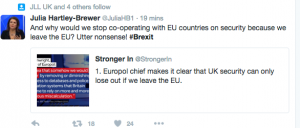June 22, 2016
#Brexit #EUref #VoteLeave #VoteIN
The traditional types of campaigning such as TV broadcasts, pamphlets and print ads are not dead. However, it is apparent from this EU referendum that campaigners are increasingly using Facebook, Twitter and YouTube in order to reach new and prospective voters.
These online platforms allow for a faster and more direct form of communication between the politicians and their voters, particularly when it comes to the younger generations. According to a recent poll, 33% of 18-24 year olds surveyed sited that social media was their main source of information about the referendum ( www.theguardian.com/media/greenslade/2016/jun/22/bbc-tops-poll-as-most-important-news-source-for-eu-referendum).
With around 15 million people using Twitter in the UK, and over 30 million using Facebook, social media will undoubtedly play an important role in shaping public opinion about the upcoming referendum. Moreover, considering that Facebook has the key demographics, information about the topic is easily accessible proving efficient for the campaign groups (http://www.cityam.com/242462/eu-referendum-whats-the-role-of-social-media-such-as-facebook-and-twitter).
From newspapers to online forums
The EU referendum in 1975, national newspapers almost unanimously pushed for the ‘yes’ vote. This time, conventional media seem indecisive about which side to take, allowing online debates and social media marketing campaigns to take centre stage.
So far the ‘Brexit’ campaign has featured heavily online, with the topic periodically trending on Twitter and Facebook. Other platforms, such as Debating Europe, allow the public to directly debate EU issues in real-time with experts and politicians.
Here is a snapshot of some typical EU tweets outlining public opinion:
So how much engagement are the social platforms gaining?
These online campaigns reach a lot of people, with the @DebatingEurope Twitter account having more than 23,000 followers, and the @LeaveEUOfficial account with more than 94,000 Twitter followers and 757,437 likes on its Facebook page.
Here are just a few from hundreds of Twitter hashtags created for the purpose of the debate:
#StrongerIn, #EURef, #GetTheFacts, #UKtostay, #Brexit, #No2EU, #Yes2EU, #LeaveEU, #BetteroffIn, #Betteroffout, #EUReferendum, #stayinEU, #MyEU #OperationCroissant #CatsAgainstBrexit #BritsDontQuit #RemainEU
These online campaigns are also more direct than newspaper articles or TV reports. They lend themselves to public engagement; a key factor in inspiring people to turn out and vote.
While TV and print are still the most important sources of political news they don’t hold the same unrivalled power they had 40 years ago. With its ever-growing presence in today’s society, social media definitely has the power and potential to sway the vote. It may all come down to which hashtag is trending or which politician’s social media presence is most engaging.
How has social media influenced your views on Europe?


Comments